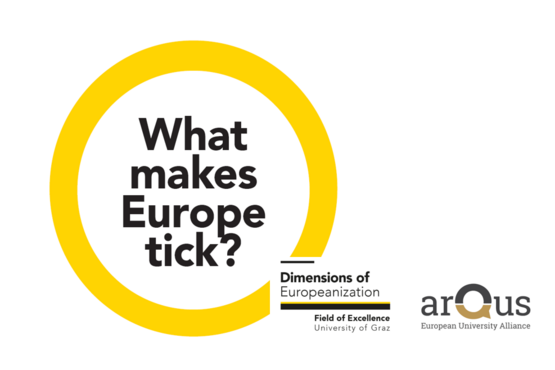Call for Papers (closed)
"Changing Societies - Dimensions of Europeanization"
ARQUS Research Focus Forum
University of Graz, May 13-15, 2022
The Field of Excellence “Dimensions of Europeanization” of the University of Graz organizes the ARQUS Research Focus Forum „Changing Societies – Dimensions of Europeanization” on May 13-15, 2022 in collaboration with the Vice-Rectorate for Research and Career Development, the ARQUS team and the Center for Southeast European Studies (CSEES).
The Field of Excellence deals with social transformation processes in Southeastern Europe from a comparative perspective. "Dimensions of Europeanization" explores changing discourses about the understanding, organization, and in particular the unification of the material and figurative territory referred to as “Europe” in time and space. It builds on the long-established research expertise in Southeastern Europe at the University of Graz.
We welcome a wide range of paper proposals from different disciplines to address the larger question of changing societies in Europe. In particular, we are inviting submissions on one of the following themes for the conference:
Localization and Regionalization as Parallel Processes to Europeanization
Europeanization is often challenged and/or reinforced by processes of localization and regionalization. The theme focuses on processes that emphasize local and regional belonging, identities and structures. These might mediate larger Europeanization processes and thus reinforce Europeanization, such as those that weaken nation states. They also might challenge Europeanization and offer alternative institutions or forms of identification. The topic is the theme for the fellowship program of the Field of Excellence during the academic year 2021-2. For the call, papers that explore the tensions and the mutually reinforcing dynamics of localization/regionalization and Europeanization are of particular interest. A focus on Southeastern Europe is welcomed, but not required.
Gender in the Former State-Socialist Countries of Europe and in their Transformations
The current rise of "anti-gender" movements across Europe raises issues of continuities and discontinuities from state socialism in the countries of the former Eastern Bloc and Yugoslavia. Although women’s emancipation and the equality of the sexes were part of the communist rhetoric and most of these countries had a history of pre-WW2 women’s movement, little of the postwar West European women’s movement discourse and agenda became known in the region before the demise of state socialism in 1989-91. Recent research has shown the many emancipatory gains for women and, in some cases, also for homosexual people, and their lasting effects for the transformation period and to the present. The last thirty years have seen emancipatory regress in many areas of social, cultural, political and economic life in the region, as well as the amplification of hostile discourses, such as, in the "anti-gender” movements.
Language and Plurality in Europe’s Changing Societies
Europe is one of the world’s least diverse continents linguistically, yet European languages are disproportionately dominant in international communication, diplomacy, science, on the Internet. Linguistic diversity is a reality in any society, including European ones, at any given time; however, the correlation between language and territory characteristic of the modern nation-state-building processes in Europe since the 19th century sometimes threatens and reduces this diversity. Additionally, political, ecological and economic issues of our own time—globalization, climate change, migration patterns, urbanization and technologization—point further to the need of studying, maintaining and promoting (linguistic) plurality in the European context, not as exceptionality, but as normality. Submissions investigating topics such as: multi- and plurilingualism in European contexts; migration, integration, language and creativity; language diversity as diachronic and synchronic normality; are especially encouraged.
Changing Societies – Changing Relationships
Europe’s relationship with others having relied to a great extent on a shared history and its colonial past is currently undergoing a rapid change. Due to changes in economic, global, and political power, China, Russia, and India, for example, have become more influential, whereas the often quoted “special” relationship between Europe and the US has suffered. Diverging positions on global issues in political, economic, and cultural terms as well as a general questioning of the transatlantic relationship is forcing Europe to be more independent of its allies and define international relationships anew. A focus on the Americas is welcomed, but not required.
Remuneration for accepted panelists from ARQUS partner universities will be covered*, as well as for a limited number of participants from other institutions. Funding is available for travel and accommodation costs for participants from Arqus universities within the framework of the Arqus European University Alliance. Please contact the Arqus Officer at your university. (*To be clarified with the Arqus rules of the Grant Agreement.)
We are very much looking forward to exchanging research and to establishing, fostering, and developing sustainable contacts with our ARQUS partner universities and our colleagues in the determined research area. The event will offer time for internal networking and will reach out to the public.
Kontakt
David Florian Bieber
Sprecher "Dimensionen Europas"Zentrum für Südosteuropastudien
Schubertstraße 21/I, 8010 Graz
Xaver Hergenröther
Forschungsmanager "Dimensionen Europas"Forschungsmanagement und -service
Harrachgasse 21/6, 8010 Graz
